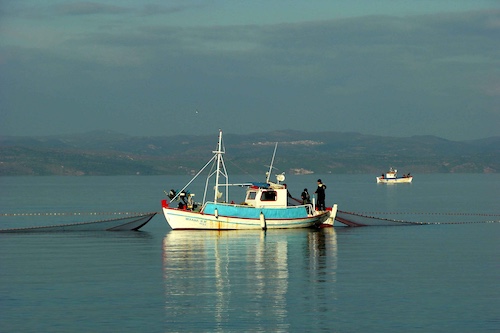There are still farmers who believe that if they cover their fields with as much plastic as possible, tasty tomatoes, potatoes or other vegetables will creep out from under it. This is in contrast to the expanding group of organizations that actually want to see Lesvos and its surrounding waters plastic-free. This sea of plastic no longer has a place on an ecological island.
While the fight against plastic on land has more or less been put into action, man has already succeeded in draining our seas and oceans empty with the latest fishing techniques. Whether it’s the craving for shark fin soup or sushi, overpopulation calls for different diets. But as long as the fish trade makes money, clear blue surfaces do not reflect the rate at which marine life is shutting down. Even as most of the coral beds are turning into graveyards, many people do not care what sea they leave behind for their children and grandchildren.
If there is such a thing as mermaid royalty it would be American oceanographer and deep-sea explorer Sylvia Earle (born 1935)*. Her list of accomplishments is long and impressive, the various diving suits and boats with which she has explored seas and oceans could fill a museum, and the many ocean floors she has admired are located worldwide. The magical underwater world touches this famous scuba diver on every dive, although a little less so in recent years, as she concludes that the oceans are dying. Today, with her relentless research and networking, she maps the downfall of vast underwater ecosystems.
In 2009, Sylvia Earle founded the nonprofit organization Mission Blue to save seas and oceans. Part of it is the project Hope Spots: 165 sites in 115 countries, all weakened stretches of sea, where, with local help, the quality of marine life can be improved. Like making it an official marine park, a protected paradise with a clean bottom with a ban on fishing, that will allow the fish population to recover.
In 2017, the Avlaki Hope Spot in Lesvos was added to the long list, being the first one in Greece. Lesvos was chosen because of its location between the Black and Aegean seas and its being on the route of both migrating birds and refugees. Avlaki, just next to Petra, was chosen for its rich fishing grounds, its proximity to a seal breeding ground and a seagull paradise on the island Agios Yorgos.
Healing Lesvos, also based in Avlaki, joined the Avlaki Hope Spot, a nonprofit organization that aims to create a new Lesvos by bringing together creatives, young people and businessmen in order to come up with new initiatives. The company has six areas of interest: alternative tourism, new forms of energy, digital nomads, repurposing of vacant buildings, an academic program in cooperation with Aegean University and cleaning the sea, as part of the Avlaki Hope Spot.
The Aegean University in Mytilini also joined the Hope Spot project. Their marine science department recently organized a seminar on the impact and management of underwater noise. Few people realize that, for example, the roaring engines of ships and the loud hammering of oil rigs also threaten the underwater world.**
The seminar was sponsored by, among others, the LIFE MareNatura project, which cares about the survival of endangered animals living around and in the sea, such as Mediterranean seals, green turtles, blowfish, porpoises, Bottlenose dolphins and Aegean gulls.
Cleaning the land has become a regular job, like on Lesvos, where not only companies care for a clean world, but also school children go out before the start of the summer to clear all plastic junk from beaches and roads. After a little internet surfing, I find that there are also a lot of other organizations that stand up for a healthier sea — only they are not so well known, like numerous groups around the world are fishing for discarded fishing nets in the seas and the oceans.
Healing Lesvos also took the challenge and set up the Removing Ghost Nets project that has just started and will run until the end of the year. Fishermen and other locals will go into the sea to catch plastic and fishing nets. No idea what they will do with all that waste.
Fishing nets left at sea are a modest source for numerous alternative businesses — changing them into fancy bracelets or processing the nets into new raw materials. The latest use of fishing nets concerns the war in Ukraine: as a defense system against drones. It would be nice if one small aspect of this sad war could be at least good for something, and help the seas and oceans rapidly to get rid of fishing nets waste, so that the Ukraine can hide under an expanded huge fishnet plate armor.
* The impressive Netflix documentary Mission Blue is kind of a biography of Sylvia Earle. One of the characters of the novel Playground by Richard Powers is also based on her life.
** Underwater noise pollution is a topic in Petra Rautiainen’s novel about whales and the oil industry: Memory of Ocean.











